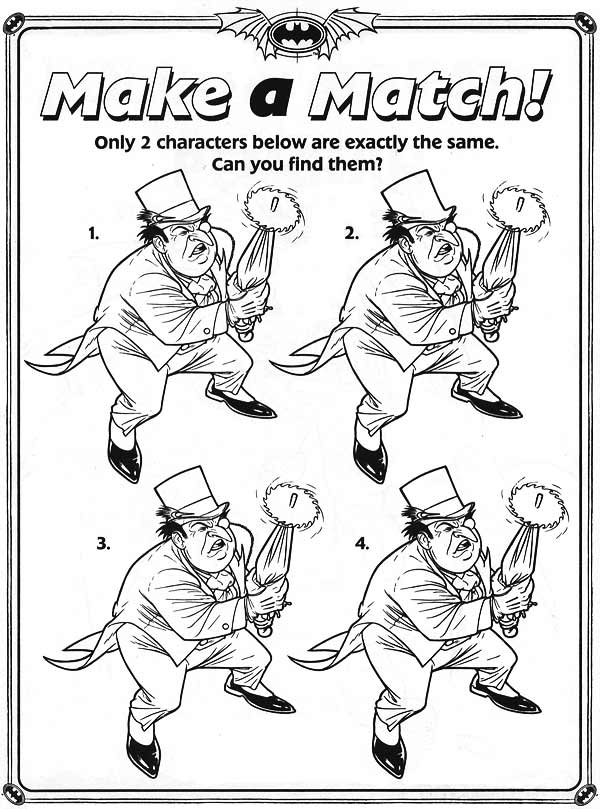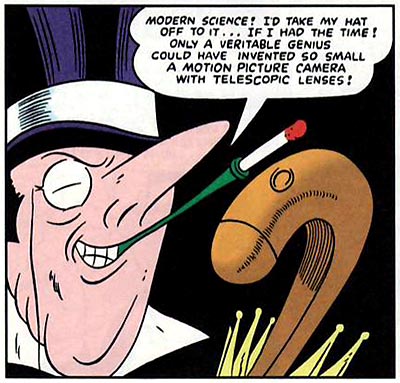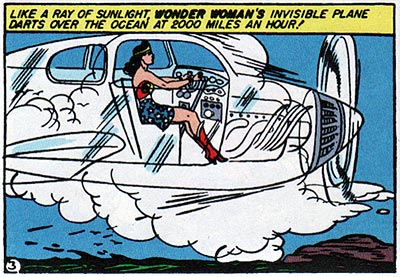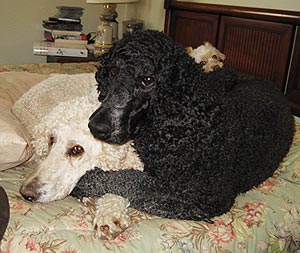Showing 11 - 20 of 39 posts found matching keyword: science
Thursday 28 March 2013
Not every umbrella tool is as awesome as a hidden flamethrower, but at least they are practical.

I'm sure a spinning saw blade at the end of an an umbrella would cut a mean slice of ham.
Comments (0) | Leave a Comment | Tags: batman comic books penguin science
Tuesday 26 March 2013
Batman isn't the only one in Gotham City with cool toys.

In "The Three Eccentrics" (Batman #21, 1944), Penguin uses a miniaturized motion picture camera hidden in the handle of his umbrella to spy on the safe of the world's richest man. Penguin's scheme is well described. Less clear is how Penguin's mark got to be the world's richest man when he's stupid enough to keep all his money inside a safe in plain sight of a first floor window.
Miniaturized cameras were hidden in the handles of canes as early as the 1920s, so Penguin's technology in this issue isn't as outlandish as, say, a bat-shaped propeller airplane that can hover in one place on autopilot. In comics the villains tend to be more realistic than the heroes. If your hero is a millionaire who dresses like a bat to fight crime in his free time, I guess they'd have to be.
Comments (0) | Leave a Comment | Tags: batman comic books history penguin science
Wednesday 14 March 2012
Coca-Cola has announced that it will change its caramel coloring manufacturing process nationally in order to minimize costs associated with conforming to a new California law. The law requires a warning label on products that contain 4-methylimidazole (4-MI) notifying consumers that the product contains carcinogenic chemicals. Without those labels, says California, people might accidentally think that drinking Coca-Cola is good for you.
California has decided that the maximum safe consumption of 4-MI is a mere 16-micrograms (mcg) -- that's 16/1,000,000 of a gram -- per person per day. According to the Center for Science in the Public Interest (CSPI), a 12-oz can of Coke can contain up to 150-mcg of 4-MI. Obviously, if you drink a can of Coke in California, you're going to get cancer.
The evidence that 4-MI is carcinogenic comes from a study where rodents were fed massive amounts of 4-MI. Cancer was found in female rats fed 250-milligrams (mg) -- that's 250,000/1,000,000 or 1/4 of a gram -- per kilogram of weight. To compare, since an average human weighs 69kg, that human would have to drink 115,000 cans of Coke each day to equal the amount of 4-MI that was proven to cause cancer in female rats. I hope you're thirsty, Californians!
Don't get me wrong; the fact that Coke is changing its manufacturing process to reduce a potentially dangerous chemical in its cans is good news. After all, we wouldn't want the rats in our trash cans to get any more cancer, would we?
Comments (1)
| Leave a Comment | Tags: coke laws scienceThursday 1 December 2011
In the past month, researchers at Yale University released a study revealing that sugar-sweetened soft drink manufacturers, especially Coca-Cola Company, have drastically increased their marketing to young children in recent years. The American Beverage Association responded: "This report is another attack by known critics in an ongoing attempt to single out one product as the cause of obesity when both common sense and widely accepted science have shown that the reality is far more complicated."
In the past month, researchers employed by the University of Oklahoma concluded a study that links consumption of sugary drinks with heart disease in women. The American Beverage Association responded: "This type of study cannot show that drinking sugar-sweetened beverages causes increased risk for cardiovascular disease. It simply looks at associations between the two, which could be the result of numerous other confounding factors."
In the past month, researchers in the U.S. Substance Abuse and Mental Health Services Administration calculated that American emergency room visits related to energy drinks have increased more than tenfold in in the past 6 years. The American Beverage Association responded: "This paper is a troubling example of statistics taken out of context. The number of emergency room visits by people who consumed energy drinks, as reported in the paper, represented less than one one-hundredth of 1% of all emergency visits."
In the past month, researchers for Consumer Reports found that 10% of commercially available apple juice exceeded the federal standard for arsenic in water. The American Beverage Association responded: "In fact, this latest report once again uses federal drinking water standards in its analysis of juice -- in no way comparing apples to apples and only creating confusion."
Today, the John C. Whitehead School of Diplomacy and International Relations at Seton Hall University will present their 2011 Global Citizen of the Year Award to Susan Neely, the President and CEO of the American Beverage Association. The American Heritage Dictionary responded: "irony (i'·ro·ny): 1. The use of words to express something different from and often opposite to their literal meaning. 2. An occurrence, result, or circumstance notable for such incongruity."
Comments (0) | Leave a Comment | Tags: coke grammar irony news science
Saturday 1 October 2011
Pepsi and their so-called "independent" polls have insisted for years that in a blind taste test people prefer the taste of Pepsi to Coke. This has been a guiding principle in my personal belief system -- which I call "People are Stupid" -- and can be demonstrated thusly:
- People who prefer the taste of Pepsi are stupid.
- Most people prefer the taste of Pepsi.
- Therefore, most people are stupid. Q.E.D.
I've always figured that only people with half a brain could prefer the taste of Pepsi. It turns out that I was more right than I had realized. Science has recently demonstrated that part of the reason that Coke outsells Pepsi may be because years of carpet-bombing the world with Coke advertisements has caused the consumer's brain to react differently in the presence of a nostalgia-inducing can of Coke than a can of Pepsi (details here). In a nutshell, the science indicates that as soon as you know you are drinking Coke, your brain tells you that you like what you are drinking, whether it tastes good or not. The proof looks something like this:
- When you see Coca-Cola, you are happy.
- You see that you are drinking a Coca-Cola.
- Therefore, you are happy. Q.E.D.
Like the rational, open-minded individual I am, I immediately wondered if I would be able to tell the difference between the two colas if I couldn't see the difference. So I decided to take the Pepsi Challenge myself. I forced enlisted my brother to be my lab assistant and instructed him to pour 6 ounces of a newly-opened 2-liter Pepsi in one glass and 6-oz. of a newly-opened 2-liter Coke in another as I waited outside the kitchen lab. Trey soon presented me with the two glasses and waited under threat of verbal abuse patiently with a pen and legal pad for me to sample the beverages and tell him which I preferred. No sooner had I picked up the first glass than my experiment went to hell.
For me to venture an honest opinion about which beverage I honestly thought tasted better, I had to remain unaware of which beverage was the Coke and which the Pepsi. I had no clue which caramel-colored cola was in the glass I was raising to my lips, but before I could even taste the contents, I could smell that it was the cloyingly sweet Pepsi. And more importantly, I therefore immediately knew it wasn't Coke. I continued to drink from this glass and the next, but only for science. I already knew what the outcome would be:
- I think Pepsi tastes like shit.
- What I am drinking smells like shit.
- Therefore, I am drinking Pepsi. Q.E.D.
I was not surprised to discover that when all was said and done, Trey had written down that the glass I liked contained Coke and the glass I didn't like contained Pepsi. Unfortunately, I suspect I will never figure out whether that decision was made by my brain or my tongue. I suspect that only my nose knows for sure.
Comments (0) | Leave a Comment | Tags: coke logic science trey walter
Friday 26 August 2011
Lately, thanks to a recent article in the New York Times newspaper, I've been reading up on decision fatigue. Apparently the act of making a decision can deplete the brain's resources to make future decisions. In other words, the more decisions that you make, the harder it is to make decisions. I think there must be something meaningful about this research, but I can't decide what that is.
For scientific purposes, the difficult-to-quantify factor that allows you to make decisions is called willpower. Willpower appears to be depleted as decisions are made, but can be replenished by ingestion of glucose. Therefore, because of my continuous consumption of Coca-Cola, I am an unstoppable decision-making machine!
However, a Time magazine article refutes the Times article with evidence that willpower is only depleted by those who believe that willpower can be depleted, making the existence of decision fatigue itself a question of willpower. This means that those who believe that they can become fatigued by decisions are fatigued by decisions, and those who don't, aren't. That's mind-over-mind for you.
The good news is that this research isn't pointless. The real lesson to take away from all of this scientific research is that because I believe that my continuous consumption of Coca-Cola makes me an unstoppable decision-making machine, it does. Take that, science.
Comments (0) | Leave a Comment | Tags: coke morals news science
Friday 28 May 2010
Stick a bunch of women on a secluded island, and there's no telling what awesome stuff they will come up with. My bet would have been on shoes, not inorganic and non-metallic transparent flying machines, but what would I know about women?

The speed of sound at sea level is 343 meters per second, or 768 miles per hour. Traveling above the ocean's waves in 1942 in her "silent, invisible plane," Wonder Woman is traveling at speeds approaching Mach 3! The technology of Man wasn't able to reach those speeds until the mid 1950s. In fact, the first pilot to pass Mach 3 was killed in the attempt when he turned too fast and horizontally inverted his plane. That plane, the Bell X-2, had a liquid-fueled rocket engine, not a seemingly simple propeller! What a pilot that wonder woman is!
Comments (0) | Leave a Comment | Tags: comic books invisible jet science wonder woman
Friday 5 March 2010
It was recently brought to my attention that England is considering legislation requiring all potential dog owners to pass a test, microchip their dog, and buy insurance in case their dog attacked someone. In theory, this plan would prevent the implementation of mobile collection and euthanasia vehicles such as have been recently employed in parts of Japan in order to restrain out-of-control wild and dangerous dog populations. After all, who could imagine a scenario where someone would abandon their animal after having paid a substantial sum to acquire it, even if that someone had lost their job in a shrinking economy after having overpaid for a vastly overvalued animal in the first place? Come on, it's not like a dog is a house.
How to solve the problem of wild, dangerous dogs is the sort of problem that would only face a government that had already banned gun ownership. Now that guns don't kill people, dogs kill people. With no threat of weapons to keep them in check, the loose dogs have formed nature's equivalent of motorcycle gangs, resorting to wandering from town to town fighting other gangs tooth-and-claw over territory, eating from trashcans, and raping all the uptight bitches. In America, we'd shoot our beloved Old Yeller if he looked at us cross-eyed, but the Brits are searching for a gentler way.
I for one applaud the idea. Owning a dog is like owning a car, and users must be qualified lest they plow through a crowd of innocent pedestrians. Better yet, using the tried-and-true, infallible "slippery slope" argument, it is clear that this action will inevitably lead to the obvious conclusion: qualifying people for parenthood. For far too long, society has allowed the bumper sticker slogan "anyone can be a father" to dictate public policy. I say that it's about time that government qualified what, exactly, that "special" quality is that makes someone a "daddy."
I suggest we follow the format of the British dog law: all prospective parents should pass a written test and buy "child insurance" in case the child one day gets lose from its restraints and bites someone. Once a child is born, we'll microchip them, mainly to prevent child insurance fraud. After all, if it's good enough for dogs, it's good enough for people.

Comments (1)
| Leave a Comment | Tags: dogs emilia july laws news poodles science victoriaSaturday 27 February 2010
The American Academy of Pediatrics wants legislation to label foods that may prevent choking hazards to children. But rather than stop simply putting a label on all phallic foods that may clog a toddler's airway, they go so far as to ask for "a recall of food products that pose a significant choking hazard," the Twinkies and Beanie-Weenies in your pantry included. As crazy as this proposal sounds, it certainly seems like this has a better chance to pass Congress as "health care reform" than any other "public option."
Comments (0) | Leave a Comment | Tags: food laws news politics science
Saturday 16 January 2010
The FDA has announced "concern" over the chemical Bisphenol A (BPA), widely used in food industry packaging for the better part of a century. BPA is a synthetic estrogen that provides plastics with added resiliency, making bottles that resist shattering. The FDA has long approved the use of the chemical, but now the agency finds itself under pressure from consumer safety groups arguing that BPA can disrupt fetal brain development and lead to increased obesity. In short, it seems that BPA can make you stupid and fat but at least you'll be more resiliant to damage.
Tests performed recently by the Canadian government agency Health Canada reveal that aluminum cans of Coca-Cola contain 0.18 micrograms (µg) of BPA per liter. The chemical leaches from the epoxy lining of the cans themselves after canning and mixes with the delicious and entirely wholesome Coca-Cola within. No wonder North America is obese: it's not our soft drinks, but our soft drink containers conspiring against us.
Canada's recommended safe level of consumption is 25 µg per kilogram of body weight per day, meaning that you would have to drink more than 138 liters of Coke PER KILOGRAM each day to consume concentrations considered unhealthy. That's over 31,108 12-oz. aluminum cans of Coke per day for the average 80kg (176lb) American. Before you panic over the FDA's announcement, compare that to the USA's advised safe level of 50 µg/kg/day!
Recognizing the severity of the situation, baby bottle manufacturers and distributors have already willingly begun turning away from using BPA in their products. That's a sound start to prevent the clearly overwhelming deleterious effects of consuming Coca-Cola on the development of your unborn baby's brain. But I suggest that it doesn't go far enough. In the interest of product safety, I recommend that everyone install an industrial Coke dispenser in their own kitchen so that they may drink Coke as nature intended: directly from the nipple. That way you can consume your American allotted 273 liters per kilogram per day safely and without fear that the chemicals in our cans are making us obese.
Comments (0) | Leave a Comment | Tags: coke illness news obesity rant science

